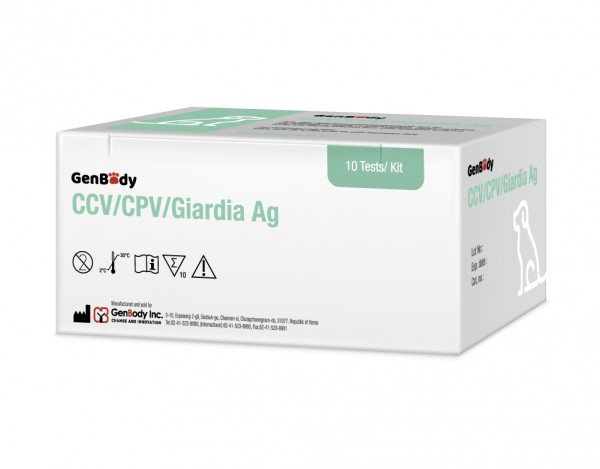Veterinary Products
Bring Technology to Your life
CCV/CPV/Giardia Ag
One step combo test for the differential detection of CCV, CPV, and Giardia Ag in canine feces.
- Product features
- Getting results In 10 minutes
- Simple and easy to use
- Optimized for Point of Care with a small diagnostic kit
- No need to use extra reader
- High diagnostic accuracy
- Economical and capable of mass testing
Specification
Specimen Feces Diagnostic target Canine parvovirus antigen/ Canine coronavirus antigen/Giardia cyst antigens Analytical sensitivity 10 X10⁴ TCID50/ml / 15 HAU / 300 Cysts/100ul of feces Shelf life 24 M Canine coronavirus (CCV) is a virus of the family Coronaviridae that causes a highly contagious intestinal disease worldwide in dogs. The virus invades and replicates in the villi of the small intestine. Intestinal disease may be related to virus-induced apoptosis (programmed cell death) of cells of the epithelial mucosa of the small intestine.
Canine parvovirus (CPV) is a highly contagious disease, characterized by bloody diarrhea, which can be fatal. Parvovirus can overtake a dog within hours of the first symptoms and result in death within 48 -72 hours. Even dogs which have been vaccinated against parvovirus still contact the disease.
Giardia is a single-celled protozoan parasite that causes intestinal infections in both dogs and cats. Dogs become infected when they ingest Giardia cysts that may be present in water or other areas of the environment that have been contaminated with feces. Symptoms are more visible in puppies and younger dogs than in older dogs and can be acute, transient, intermittent, or chronic in nature. In some cases, dogs will exhibit diarrhea that is soft, frothy, greasy, and with a strong odor or excessive mucus.




